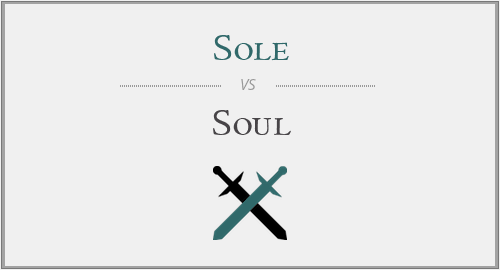Sole vs. Soul
Whether it’s for a paper you’re writing or for your own general knowledge, it’s essential to know the distinct meanings of “sole” and “soul” in order to use them properly in your writing.
But before we get into a detailed explanation for each word, let’s take a quick look at the contexts in which they are used. “Sole” can be used both as an adjective and a noun, whereas “soul” is only ever a noun. In both cases, each word has several different meanings, depending on the context. Read the examples below to learn exactly in what situations you can use “soul” and “sole” correctly.
When do we use “sole”?
Sometimes used as an adjective, other times as a noun, “sole” is a common English word with various meanings depending on context. As an adjective, “sole'' is primarily a perfect synonym for “only”, when referring to a single person, object, situation etc.; but it can also be used to describe something that is not shared with anyone else. In both cases, when the word is used as an adjective, it is always placed before a noun.
Furthermore, as a noun, “sole” has three completely different meanings, depending on the context in which it is used. Firstly, “sole” may refer to the underside of the foot’ the part that people walk on. Secondly, it may refer to the part of the shoe that has contact with the floor. Thirdly, “sole” is also the name of a flat, small fish that can be eaten.
Example 1: He was the sole survivor of that unfortunate expedition. – as an adjective, “sole” is also used before a noun and describes the “only” one.
Example 2: Our manager has sole responsibility for this project. – “sole” can also be used as an adjective describing something not shared with anyone else.
Example 3: She could feel the fine sand with the sole of her foot. – used as a noun, “sole” can refer to the bottom part of the foot that people walk on.
Example 4: I need to buy a new pair of shoes, the sole of the right shoe in this pair is ruined. – “sole” can also be used as a noun to define the part of the shoe under the foot.
Example 5: We’re having lemon sole with vegetables for dinner. – lastly, the noun “sole” is also the name of a small and flat fish that people eat.

When do we use “soul”?
Simpler than “sole” due to it belonging only to one word order, “soul” is only ever a noun. The word has three completely different meanings, according to the context in which it is used. The primary meaning for the word “soul” is the spiritual essence or core of a person that has no physical entity and which some people or religions believe continues to exist beyond this lifetime. Many believe the soul is the true person and the human body is there to house it, so to speak.
Secondly, “soul” is the name of a popular musical genre, originally performed by Black Americans, which usually expresses deep feelings and emotions. And lastly, “soul” can also be used informally – not in formal contexts – when referring to a person.
Example 1: May her soul rest in peace. – “soul” is considered to be that part of a person that is not their physical body and that is considered by some to continue to exist even after physical death.
Example 2: Soul and classical music were my favorites during my difficult teenage years. – “soul” is the name of a musical genre expressing deep feelings.
Example 3: The streets were so empty when I went out that I didn’t see a soul. – informally, “soul” can be used as a synonym for “person”.
Conclusion
Although they sound very similar, and even though they have multiple meanings and belong to differing word orders, “sole'' and “soul” actually have nothing in common and are two words with completely different meanings. Make sure you correctly understand and remember each of them in order to avoid using one instead of the other and to spell them correctly.
And, for anytime you may feel confused or unsure about their meanings, feel free to come back and check this page for detailed explanations and clear examples.




Have a discussion about this article with the community:
Report Comment
We're doing our best to make sure our content is useful, accurate and safe.
If by any chance you spot an inappropriate comment while navigating through our website please use this form to let us know, and we'll take care of it shortly.
Attachment
You need to be logged in to favorite.
Log In